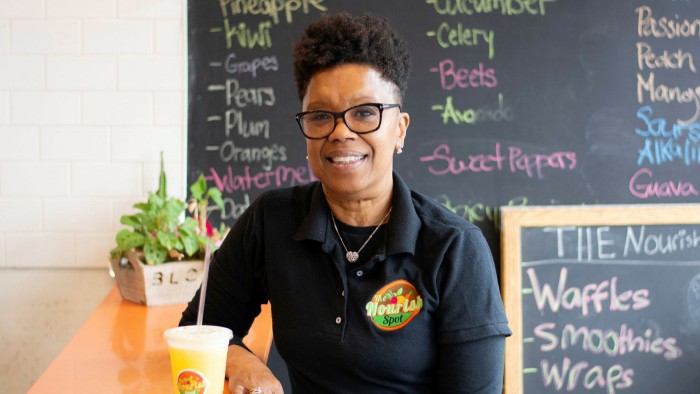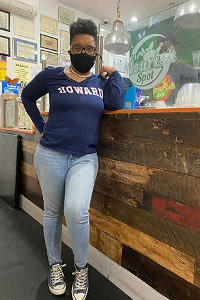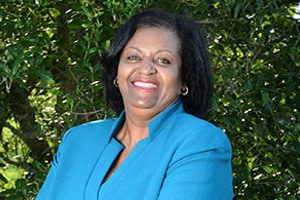Black women entrepreneurs fight to stay afloat in the pandemic

Roula Khalaf, Editor of the FT, selects her favourite stories in this weekly newsletter.
When Dawn Kelly began planning to open her juice bar in 2017, she never considered applying for a small business loan.
“I had already heard in the streets that banks don’t loan money to small business owners,” says Kelly, who is black, “and they especially don’t loan money to black women small business owners, so I didn’t even try.”
Instead, the 58-year-old New Yorker used the severance package she received after leaving her job as a communications executive at Prudential Financial to fund The Nourish Spot herself. The business, in Jamaica, Queens, now has 10 employees after two quit because of the pandemic.

And Kelly’s success story is one of many. Black women are the fastest-growing demographic of entrepreneurs in the US, founding more businesses than any other demographic before the pandemic. Yet the legacies of discriminatory lending practices and widespread mistrust of traditional financial institutions have led many to believe that their options for accessing capital are limited.
When Covid-19 devastated America’s small business landscape a year ago, black women business owners say the gaps between themselves and their competitors became even pronounced.
“The challenges are real,” says Melinda Sylvester, the owner of Tel-Mel Media & Publishing, a publishing company in Georgia. Based on what she has seen in her community, she says black women’s businesses are lagging behind and not catching up with those owned by black men.
The Nourish Spot now operates through kerbside pick-up and delivery only, and was able to get a loan through the Paycheck Protection Program, but it relies on Kelly’s tight-knit community to stay afloat.
“I believe in networks: being able to reach into the New York City ecosystem of other entrepreneurs and ancillary organisations that help,” she says. “We have those ties and that is what is going to help me weather this pandemic.”
Most small businesses say both their revenues and the number of people they employ have fallen since 2019, according to research conducted by the Federal Reserve in October. Of nearly 10,000 small businesses surveyed, 57 per cent rated their businesses’ financial health as “fair” or “poor”. Among black entrepreneurs, that share was 77 per cent (the share was 79 per cent for Asian-owned businesses).
Black entrepreneurs are also over-represented in the industries most disrupted by the pandemic, including food service, retail and personal care. But unlike white, Hispanic, and Asian business owners, they told the Fed they expected their biggest ongoing challenge not to be Covid regulations or reduced demand from customers, but access to credit.
Many businesses struggled to access the funding needed to sustain operations despite the disruption of the pandemic. However, black business owners were the least likely to say they received the full amount of financing they sought.
The initial rounds of the federal Paycheck Protection Program, which aimed to avoid lay-offs, favoured large businesses and those with relationships to traditional financial institutions.
In New York, there are also fewer lenders that can issue such loans in historically black neighbourhoods such as the Bronx and eastern Brooklyn, according to a report by small business advisory firm Next Street and advocacy group Common Future.

Due to the pandemic, “businesses were going through the fear factor,” says Elayne Brunson, co-founder of the Black Chamber of Commerce chapter in Sumter County, South Carolina. Some businesses failed or had to scale back because demand was low, with customers fearful of going outside.
Member businesses now rely on the Chamber for information about accessing stimulus funds and other local business grants to help cover rent and utility payments. Others need its facilities to access the internet.
“South Carolina has lower costs compared to other areas . . . and for them to be one pay cheque away [from being able to pay their bills] just kind of lets you know how rural and urban America is doing,” Brunson says.
According to Brunson, it is black women with businesses that predate the pandemic and still have brick and mortar premises, such as Kelly’s juice bar, that have struggled the most.
Some have changed their business models entirely. Sylvester pivoted her publishing firm to focus on marketing work. The refit was complicated by the death of one employee from Covid. She now has 10 employees.

“You have your pity party, and then you think ‘what’s next?’” says Sylvester, who also leads the greater Georgia chapter of the Black Chamber of Commerce.
The outlook is not entirely gloomy. Brunson says soaring home values throughout the crisis have buoyed her own real estate investment business. The Chamber has also gained several new members who started businesses designed to operate entirely online, with few start-up costs.
But without stronger ties to the traditionally white male-dominated industries of banking and venture capital, Brunson worries they might struggle to grow beyond one employee. In the meantime, the Chamber is organising virtual training sessions and collaborating with local lawmakers on a dedicated grant programme.
“It’s not that we want to take over the old boys club,” Sylvester says. “We just want an invitation.”
This article has been amended since first publication to add that 79 per cent of Asian-owned businesses in the Federal Reserve study rated their businesses’ financial health as “fair” or “poor”.
Comments